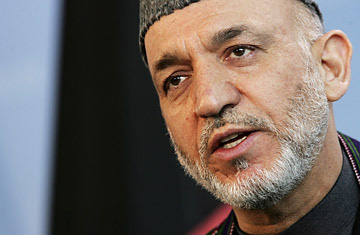
Afghan President Hamid Karzai
The President of Afghanistan remains unrelenting in his criticism of neighboring Pakistan, even as that nation begins a sensitive political transition. In an interview with TIME in Kabul, Hamid Karzai said the way to fix Afghanistan is to fix things in Pakistan. "Arrivals and departures don't matter much," said Karzai, coolly referring to the resignation of his counterpart, Pervez Musharraf, with whom he had particularly testy relations. "What matters is institutional corrections." His government has exchanged increasingly harsh words with Islamabad over the past few months, alleging a Pakistani hand in Afghanistan's security problems. He was particularly pointed about Pakistan's Inter-Services Intelligence (ISI) spy agency. "If Pakistan is using radicalism as a tool of policy for strategic depth in Afghanistan, well, I wish to tell them that it won't work," Karzai said.
Karzai clearly believes that the growing violence in Afghanistan is the result of ISI support for the resurgent Taliban, a group whose regime was cultivated by the Pakistani spy agency until 9/11. During the past 24 hours, two waves of eight suicide bombers have attacked the U.S. base in Khost; and 10 French soldiers, part of the NATO force, have been killed in an ongoing battle near Kabul. In his interview, Karzai was sympathetic toward Pakistani Prime Minister Yousuf Raza Gilani, who has tried in vain to impose civilian control over the ISI. "Mr. Gilani is a good man," said Karzai. "He has the right intentions. I hope he gets the tools of control. That is for the Pakistani government to decide, and that is for us and the international community to help him with."
While wishing Musharraf's successor as head of government well, Karzai also held out an olive branch to General Ashfaq Kayani, Musharraf's successor as head of the Pakistani military — a position that remains a center of power in that country. Kayani visited the U.S. Air Force base at Bagram today, and Karzai said he spoke to the Pakistani general to welcome him. He said he told Kayani that "Afghanistan cannot achieve peace or prosperity without friendly relations with Pakistan." He added, "I hope [Kayani] recognizes that what they are doing [in terms of supporting militancy in Afghanistan] is causing immense damage to Pakistan itself. Someone has to recognize this need for change and for a modern relationship with Afghanistan, a civilized relationship. I hope it will occur."
On that point, Karzai was adamant. If Pakistan does not change "its policy towards its neighbor, there will be trouble," he said. He decried efforts he sees as attempting to restore the Taliban regime that are beholden to the ISI. A destabilized Afghanistan, he said, "having a weak puppet government" will only affect Pakistan's restive border provinces, replicating "what is happening in Afghanistan." It is from those regions of Pakistan, he reiterated, that the terrorism that plagues Afghanistan originates. Said Karzai: "The war against terrorism will not be won unless and until we go to the sanctuaries, to the training grounds, to the financiers, to the motivators of hatred that come across the border to kill us all." Those tribal territories of Pakistan, he said, "will not be peaceful as long as [the ISI's policy] continues. When that changes, yes, the tribal territories will become peaceful."
